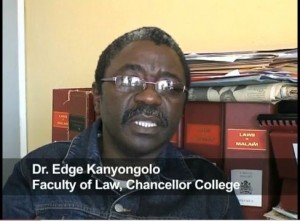Here are a number of rude words that begin with the letter “F”, but federalism is not one of them. Yet, judging by the horrified reactions that have greeted recent calls for converting Malawi into a federal state, federalism might as well be at par with other more notorious f-words.
As has been the case on too many occasions in the past, the federalism debate has quickly descended into emotive quarrels that cloud, rather than clarify the issues at stake.
The clouding of the debate starts with the mixing up notions of federalism and secession.
Listening to various talking heads pontificating on the subject, it is rarely clear what the debate is really about. Is this about reorganising Malawi into a federal state? Or is it about secession by the Northern Region and its establishment as a separate and independent state? This question must be answered clearly before we can even begin to have a debate about the merits and demerits of the proposal.
Listening to the main arguments advanced this far, it is clear that the blame for confusing, rather than clarifying the issue lies on both sides of the divide. On the one hand, some proponents of federalism appear to suggest that the future they envisage is one in which a region in particular the Northern Region will take full responsibility for its development. It is difficult to see how this vision could be realised within the framework of a federal state.
Typically, in federal states, national economic planning and control of the national purse remains with the central government, as is the case in federal states such as Nigeria, India, Canada, Ethiopia, Switzerland, the United States of America (USA) and Australia.
Typically, the power of regional governments in such federal arrangements tends to be limited; certainly not enough to allow people in those regions, provinces or states to enjoy the degree of autonomy and independence that appears to be envisaged by many of the proponents of federalism for Malawi.
It seems to me that the degree of regional autonomy and independence control of development planning and funding that some proponents are advocating comes with secession. Could it be then, that what we are really debating is secession? If that be the case, then let us call a spade a spade and not pretend that what we are discussing is federalism.
Proponents of federalism have also failed this far, to explain how federalism or secession in and of itself, can cure the problems of discrimination and inequity. This has only succeeded to make the debate even foggier.
Opponents of federalism have not helped matters either. Their only response to those advocating for federalism (or is it secession) seems to be limited to saying repeatedly that the advocates of federalism wish to divide the country. Of course, raising the spectre of disunity is by the opponents of federalism because it appeals to the human being’s primal and instinctive longing for community and fear of separation and isolation.
In most of the responses of the opponents of federalism, I have seen no clear explanation of whether what will divide the country is federalism, secession or either. While it is easy to see how secession would mean the end of Malawi ought existence as a unitary state, those who warn of disunity to explain how such disunity would necessarily result from having a federal constitution.
If both sides of the argument persist with the confusion and conflation of federalism and secession, the ‘debate’ will be reduced to a shouting match involving expression of political frustrations and old regionalistic prejudices. This will not only be unproductive, but will also obscure what I suspect are the underlying factors that trigger and fuel the calls for federalism or secession in Malawi.
In my view, the calls are merely a symptom of two underlying problems: incomplete implementation of the National Decentralisation Policy and apparent pervasive nepotism in the ruling class.
I suspect that if the decentralisation policy were fully implemented, local authorities in the country’s various regions would wield such amounts of political, functional and fiscal powers that there would be little appetite for federalism or secession.
In the same vein, if successive governments and political leaders since independence had not been as nepotistic as they have been, there would be little reason for any sections of the population to feel marginalised and, therefore, motivated to seek autonomy. Yet, regime after regime, our ruling elites have persisted in nepotistic public appointments, allocation of public resources and public pronouncements.
Does this mean we should, therefore, abandon the debate? Not at all. However, if we want to make progress even at that symptomatic level, let us be clear about what the debate is about.




